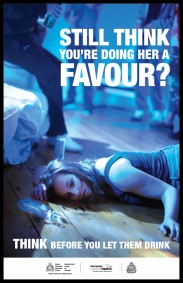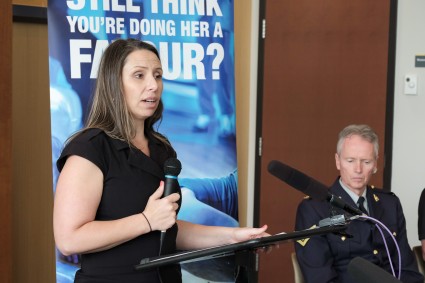VCH, local law enforcement launch ‘Think before you let them drink’ campaign
“This picture only scratches the surface of what can happen.”
These are the telling and unsettling words of Calista Fanthorpe, 21, commenting on the poster for Vancouver Coastal Health’s 2016 anti-bootlegging “Think Before You Let Them Drink” campaign. The image is of a teenage girl passed out face down on a floor at a party. 
Calista started drinking at age 12. It wasn’t long before the West Vancouver resident was binge drinking, taking drugs, engaging in risky behaviour and having run-ins with police. She’s been sober for 18 months, but it’s been a struggle.
Calista says adults who buy alcohol for minors, allow their kids to drink in their basement or condone consumption in any form are sending the wrong message.
“It is a big disservice to youth,” said Calista at the campaign launch at the HOpe Centre Wednesday. “It is the adult’s job to set the kids straight and adults aren’t doing a good job.
Parents allowing kids to drink in the basement is totally messed up.”
It’s important for adults to instill good values in their children, says Calista, and saying no is a good start.
Binge drinking a problem on North Shore
According to the 2015 McCreary Report How Many is Too Many?, the North Shore and Sea-to-Sky corridor have the dubious distinction of having the highest rate of teen binge drinking in the province. Lions Gate Hospital’s Emergency Department, for instance, sees on average 110 teen alcohol-related visits each year. It is the second most common reason youth present for service.
Campaign organizer Kerrie Watt, who is also a VCH alcohol and drug prevention educator, chose to focus this year’s campaign on young women who binge drink.
Binge drinking puts young women at risk
“Here’s a little of what we know about young women and alcohol in a society that has an incredibly normalized alcohol culture, where indulgent and excessive drinking is celebrated and applauded,” says Kerrie.
- Young women are close to matching their same age male counterparts in consumption rates but with an unequal result.
- Women are at greater risk for reproductive cancers such as breast cancer; and the risk of stroke is at least double that of men when they exceed the limits set in the low risk guidelines
- That closing the gender gap in this situation has resulted in young women pulling the short straw in terms of both immediate and long term health outcomes, many of which young adolescent women are completely unaware of.
- The rate of binge drinking among young women in both Canada and the US, is increasing.
- Binge drinking puts young women at greater risk for unprotected sexual activity, STI’s, remorse for engaging in sex while intoxicated, and sexual assault. (This trend resonated strongly within the team of Public Health Nurses who run our 4 youth clinics when I consulted with them on what they see and experience here on the North Shore,” says Kerrie.)
- Binge drinking is also associated with increased risk of self harm, attempted suicide and lower ratings of self-confidence in young women.
“What this means is that when it comes to young women, the prevailing attitude is that if boys can have a drinking culture, then so can young girls,” says Kerrie. “But believe it or not, parents and other adult mentors are still influential in the lives of their young people. Youth do care about what we think about them and the choices they make.”
Poster image an accurate depiction
West Vancouver Police Const. Jeff Palmer and RCMP Cpl. Richard de Jong both spoke about the reality the poster image captures.
“It is a blunt but accurate depiction of what our officers deal with,” says Const. Palmer. “Alcohol is the number one gateway drug in Canada.”
Cpl. de Jong reiterated that giving alcohol to minors is a criminal offence and puts a young person in a dangerous situation that may have life changing consequences.
“When we have safer teens, we have a safer, healthier community,” says Cpl. de Jong. ”
Although Calista is marking 18 months of sobriety, she wishes her life had taken a different path. “We were self-destructive and many adults seemed to condone it. Please don’t buy alcohol for minors,” says Calista.
VCH has partnered with the B.C. government to provide online resources for parents to help maintain healthy connections with their children. (www.healthyfamiliesbc.ca)

Kerrie Watt, alcohol and drug prevention educator, speaks at the launch of VCH’s “Think before you let them Drink” anti-bootlegging campaign at the HOpe Centre on Wednesday.

